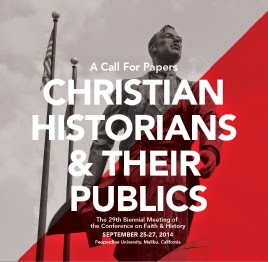 The final session I attended at the Conference on Faith and History was titled “The Christian Right and the Search for a Usable Past.” Gregg Frazer, Professor of History at The Master’s College chaired the session and provided closing comments.
The final session I attended at the Conference on Faith and History was titled “The Christian Right and the Search for a Usable Past.” Gregg Frazer, Professor of History at The Master’s College chaired the session and provided closing comments.
Three papers were presented:
1. “Fallen Walls and Open Doors: An Analysis of David Barton as a Christian Historian,” by Matt McCook, Professor at Oklahoma Christian University.
In my view, McCook started out on thin ice by referring to Barton as an historian. However, from there, the presentation improved as he revealed many familiar illustrations of Barton faulty historical work. Not surprisingly, McCook called for historians to present the narrative accurately without efforts to shape the past into a politically useful one.
Quotes/paraphrases:
A religiously ambiguous Thomas Jefferson is not useful to the Christian right.
Walls such as have been established by David Barton must come down.
2. “Popularizing a Usable Past: The Providence Foundation, Kirk Cameron, and the Legacy of Francis Schaeffer” by Grove City College graduate Charles Cotherman who is now at the University of Virginia.
Cotherman compared and contrasted Kurt Cameron’s movie Monumental with Francis Schaeffer’s How Shall We Then Live? Both efforts used history to effect the culture war and both were less than stellar on historical precision according to academic historians. However, Cotherman presented evidence that Schaeffer’s efforts resulted in the intellectual betterment of some evangelicals who went into scholarly work via Schaeffer’s inspiration. However, such results are not likely to derive from Cameron’s movie. The amateur historians recruited by Cameron are too fact-challenged to lead to any positive result.
Quotes/paraphrases:
Cameron’s Monumental reflects decrease in public intellectualism.
Schaeffer would roll over in his grave at the praise for the aesthetics of the Monument to the Forefathers.
3. “In the Stream of God’s Sovereign Plan”: Providential History and Nostalgia in the American Quiverfull Movement by Emily Hunter McGowin student at the University of Dayton.
Emily discussed the historical revisionism of G. Botkin who is at the forefront of the Quiverfull Movement (having many children and raising them in accord with strict gender roles).
Quotes/paraphrases:
Members of the Quiverfull movement are members of restorative nostalgia.
Nostalgia tells it like it wasn’t.
Summary/discussion:
Gregg Frazer then summarized the papers and hit his sweet spot with a couple of quotes/paraphrases that summed up the session:
Complicit in the promotion of bad history are the media, political organizations, churches etc. who invite David Barton to speak.
Historical revisionists find what they set out to find.
Gregg was right on target and even though difficult encouraged Christian historians to keep “pushing the boulder up the hill” in a Sissyphus-like effort to bring historical integrity to Christians. Probably many Christians would be surprised to find out the extent of the distance between Christian historians and Christian advocacy groups on matters of historical accuracy.